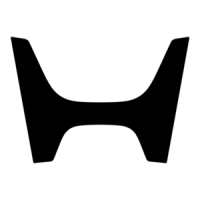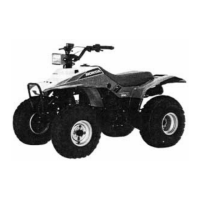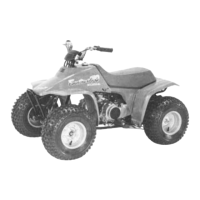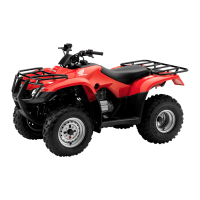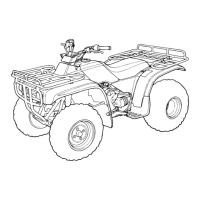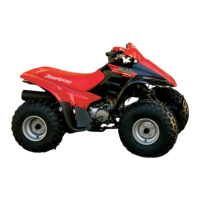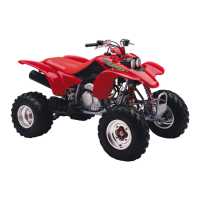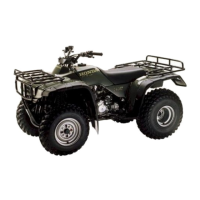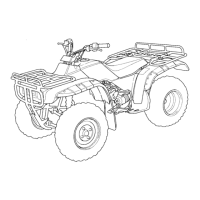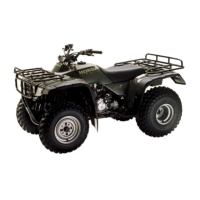Do you have a question about the Honda TRX70 Fourtrax 1986 and is the answer not in the manual?
Safety guidelines for operating and maintaining the Fourtrax, covering ventilation and fire hazards.
Rules for using genuine parts, tools, and following proper service procedures for repairs.
How to identify the specific model year and serial numbers of the Fourtrax for accurate service.
Technical data and dimensions for the TRX70, including engine, frame, and carburetor details.
Specified torque settings for various engine and frame bolts and nuts.
List of special and common tools required for maintenance and repair procedures.
Instructions and diagrams for correctly routing wires and cables to prevent damage.
Information on federal regulations for vehicle noise emission control and prohibited tampering.
General information and overview of lubrication services for the Fourtrax engine.
Engine oil capacity and recommended oil types and viscosities.
Specific torque value for the oil drain plug during engine oil changes.
Common lubrication-related issues and their probable causes.
Procedure for checking the engine oil level using the dipstick.
Step-by-step guide for draining old oil and refilling with new oil.
Instructions for cleaning and maintaining the oil filter rotor and screen.
Identification of all critical lubrication points on the Fourtrax, including cables and pivots.
General overview of maintenance procedures and recommendations for the Fourtrax.
Key specifications for various maintenance items like valve clearance and tire pressure.
Torque specifications for critical fasteners related to maintenance tasks.
List of tools required for performing scheduled maintenance tasks.
Recommended maintenance intervals and tasks for the Fourtrax based on operating conditions.
Inspection and replacement procedures for fuel lines to ensure proper fuel delivery.
Instructions for removing, cleaning, and reinstalling the fuel strainer screen.
Checking throttle lever free play and ensuring smooth operation across steering positions.
Procedure for removing, cleaning, and re-oiling the air filter element.
Inspection, gapping, and replacement of the spark plug for optimal engine performance.
Procedure for inspecting and adjusting valve clearance to ensure proper engine operation.
Steps for checking and adjusting the engine's idle speed and carburetor settings.
Procedure for testing cylinder compression to diagnose engine power issues.
Steps for checking, adjusting, and lubricating the drive chain for optimal power transfer.
Inspection and replacement of the drive chain slider for wear or damage.
Procedure for checking brake shoe wear using an indicator plate.
Maintenance and adjustment of both front and rear brake systems for safe operation.
Procedure for adjusting the clutch system to ensure proper engagement and disengagement.
Instructions for cleaning the spark arrester to maintain exhaust system efficiency.
Regular checks for tightening nuts, bolts, and fasteners to ensure structural integrity.
Inspection of tires for damage and checking tire pressure for safe handling.
Maintenance and adjustment of steering system components for proper control and safety.
Overview of fuel system components and services, emphasizing safety with gasoline.
Fuel tank capacity and carburetor identification details.
Specified torque for the intake pipe mounting bolt connecting to the carburetor.
Identification of the float level gauge tool.
Diagnostic guide for common fuel system issues like starting problems, rough idling, and mixtures.
Procedures for removing and installing the fuel tank, including safety notes.
Steps for removing the air cleaner case for servicing or replacement.
Detailed steps for safely removing the carburetor from the engine.
Instructions for disassembling the throttle valve assembly within the carburetor.
Step-by-step guide for disassembling the carburetor, including inspecting key components.
Reassembly procedures for the carburetor, emphasizing new O-rings and careful handling.
Method for measuring and setting the correct float level in the carburetor.
Procedures for installing the carburetor back onto the engine, including adjustments.
Steps for adjusting the pilot screw for proper idle speed and engine performance.
How to adjust the carburetor for optimal performance at high altitudes.
General information regarding engine removal and installation for transmission and crankshaft service.
Engine oil capacity relevant to engine removal/installation procedures.
Torque specifications for engine mounting bolts and brake pedal bolts.
Detailed step-by-step instructions for safely removing the engine from the Fourtrax frame.
Procedures for reinstalling the engine, including wire routing and filling with oil.
Overview of services for cylinder head, valves, camshaft, and rocker arms.
Technical specifications for cylinder head components, including clearances and dimensions.
Torque specifications for cylinder head cover, bolts, and related fasteners.
List of specialized tools required for cylinder head and valve maintenance.
Diagnostic guide for cylinder head issues like low compression and excessive noise.
Step-by-step guide for removing the cylinder head from the engine.
Procedures for disassembling the cylinder head, including rocker arms and valve components.
Steps for reassembling the cylinder head, including valve stem seals and springs.
Procedures for installing the cylinder head onto the engine, including gasket replacement.
Overview of maintenance and inspection for cylinder and piston components.
Technical specifications for cylinder bore, piston dimensions, and clearances.
Torque values for the cam chain guide roller bolt and cylinder mounting bolt.
Common issues related to cylinder and piston, such as low compression and smoke.
Step-by-step instructions for removing the cylinder from the engine.
Procedures for removing the piston from the cylinder, including the piston pin.
Inspection of piston rings, piston, and piston pin for wear and damage.
Measuring piston diameter and calculating cylinder-to-piston clearance.
Proper method for installing piston rings, ensuring correct orientation and gap spacing.
Procedure for installing the piston into the cylinder, including lubrication and alignment.
Steps for installing the cylinder onto the engine, ensuring proper gasket and cam chain placement.
Overview of maintenance for clutch, oil pump, and gearshift linkage systems.
Technical specifications for clutch components like spring length and disc thickness.
Torque specifications for various fasteners related to clutch and linkage systems.
List of common tools required for clutch and linkage service.
Common issues with clutch operation, shifting, and transmission jumps.
Steps to remove the right crankcase cover to access clutch and oil pump components.
Procedure for removing the clutch lifter mechanism.
Detailed steps for removing the clutch assembly from the engine.
Procedures for disassembling the clutch assembly, including plates, discs, and springs.
Inspection of clutch components like springs, discs, rollers, and plates for wear or damage.
Steps to remove the gearshift linkage components, including spindle and pedal.
Procedures for reinstalling the gearshift linkage assembly.
Removal, inspection, and installation procedures for the engine oil pump.
Detailed instructions for assembling clutch components, including springs, plates, and discs.
Procedures for installing the assembled clutch back into the engine.
Removal and installation of the rear brake pedal pivot assembly.
Steps for reinstalling the right crankcase cover, including gasket and bolt tightening.
Overview of services for the recoil starter, alternator, and cam chain tensioner.
Technical specifications for the cam chain tensioner spring.
Torque values for starter driven pulley, flywheel nut, and cam chain tensioner bolts.
List of common tools needed for servicing these components.
Diagnostic guide for issues with the recoil starter and engine not turning over.
Step-by-step instructions for removing the recoil starter mechanism.
Procedures for disassembling the recoil starter, including the spring and ratchet.
Detailed steps for removing the alternator from the engine.
Removal, inspection, and installation of the cam chain tensioner.
Procedures for assembling and installing the recoil starter mechanism.
Steps for reinstalling the left crankcase cover and drive chain cover.
Overview of transmission and crankshaft maintenance, noting engine removal necessity.
Diagnostic guide for transmission issues like hard shifting and excessive noise.
Detailed procedure for separating the crankcase halves to access internal components.
Removal, inspection, and measurement of the crankshaft, including runout.
Disassembly and inspection of transmission components like gears, shift forks, and drums.
Procedures for replacing crankshaft and transmission bearings.
Steps for assembling transmission shafts, gears, and shift forks.
Procedures for assembling crankcase halves, including transmission components.
Overview of maintenance for the front wheel, brake, and steering systems.
Technical data for front wheel, brake drum, steering shaft, and kingpin components.
Torque specifications for front wheel, handlebar, steering, and brake fasteners.
List of common tools required for front wheel, brake, and steering system service.
Diagnosis for steering issues, wheel wobbling, and poor brake performance.
Procedures for removing and installing the handlebar, grips, and related controls.
Steps for removing and installing the front wheel, including torque specifications.
Procedures for tire removal, repair, and mounting, including bead breaking and patching.
Inspection and maintenance of the front brake drum, linings, and bearings.
Maintenance and adjustment of steering system components, including tie-rods and kingpins.
Overview of maintenance for the rear wheel, brake, and drive mechanism.
Diagnosis for rear wheel wobble, poor brake performance, and drive mechanism issues.
Step-by-step instructions for removing the rear wheel and tire assembly.
Reference to tire service procedures found in another section.
Procedures for removing the rear brake drum, shoes, and related components.
Inspection of rear brake lining thickness and brake drum wear.
Steps for disassembling the rear brake shoes, springs, and cam.
Removal and installation of the rear brake pedal assembly.
Maintenance of the drive mechanism, including chain, sprockets, and axle.
Inspection of the driven sprocket, damper rubbers, axle runout, and bearings.
Procedures for replacing bearings in the rear axle housing.
Steps for installing the rear brake panel, cam, shoes, and adjusters.
Procedures for installing the rear wheel, axle nut, and wheel bolts.
Procedures for removing and installing the front and rear fenders.
Steps for removing and installing the exhaust pipe and muffler assembly.
Overview of the ignition system, including timing and component checks.
Diagnostic guide for ignition system problems like starting issues and no spark.
Inspection and testing procedures for the ignition coil's primary and secondary resistance.
Measuring resistance of the alternator exciter coil.
Testing the CDI unit for proper operation using a specialized tester.
Inspection of the pulse generator's resistance.
Procedure for checking and verifying the ignition timing using a timing light.
Inspection and replacement of the ignition switch after the '86 model year.
Checking the continuity of the engine stop switch in various positions.
Testing the neutral switch for continuity when the transmission is in neutral.
Wiring diagram specific to the '86 model year, showing component connections.
Wiring diagram for models after the '86 year, illustrating updated connections.
Comprehensive guide for engine starting problems, covering fuel, spark, and compression.
Diagnostic steps for identifying causes of reduced engine power, including clutch and ignition.
Troubleshooting guide for issues affecting low-speed and idle engine performance.
Troubleshooting guide for problems occurring at high speeds, including valve clearance and fuel flow.
Troubleshooting steps for handling issues like heavy steering, wheel wobble, or pulling.
| Brand | Honda |
|---|---|
| Model | TRX70 Fourtrax 1986 |
| Category | Offroad Vehicle |
| Language | English |
